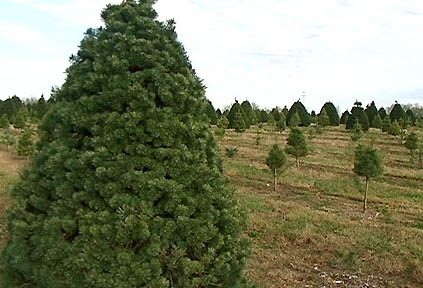Christmas Tree Farmers Feeling Effects of Drought
Christmas Tree Farmers Feeling Effects of Drought


Trees, like any agricultural product that grows from the ground up, need water. Christmas trees included. This year’s drought has taken its toll on Christmas tree farmers in Kentucky, and it has not been just the lack of rain. A spring freeze followed by a summer hail storm only added to their woes.
“The big trees survived it okay because they have a fairly well developed root system,” said Bill Moody, a retired University of Kentucky College of Agriculture professor who grows Christmas trees on about two acres at his Fayette County home. “The smaller seedlings just couldn’t stand it and looking down the road, six to seven years, those losses really take a heavy toll.”
Moody says he lost more than 50 percent of the seedlings he planted two years ago and that is evident from the little brown trees that stand out in the rows with the green ones that survived. In a year when Thanksgiving arrived as early as possible on the calendar, it should give Christmas tree farmers an extra weekend between the two holidays for customers to come out and cut a fresh tree but not for Moody.
“So this year we are only going to be open two weekends mainly because we don’t have that many saleable trees,” Moody said. “It’s going to hit us hard, but we still have some really nice trees, we just don’t have that many.”
With the lack of rain the trees have not developed during the growing season like they would in a year with ample rain. That’s why Moody may not have as many trees as he would like to sell or the public would like to buy.
“You will see them with not that much growth on the trees as normal,” said Deborah Hill, UK extension forestry specialist. “And even though we prune them to the correct shape for a Christmas tree, I think you will be aware there is not as much growth on those trees as you are used to seeing, especially if you are a repeat customer and come to the same lot year after year.”
Most of Moody’s clientele are repeat customers as is the case for Dale Barker of Barker’s Christmas Tree Farm in another area of Fayette County. Barker isn’t as concerned about the effects of the drought this year as he is the future.
“Some of the larger trees, I don’t think we are seeing the effect of what the drought has really done just yet,” said Barker. “We will probably be wondering in a couple of years when there is plenty of rain why the trees are dying. It’s not what happens this year, it’s down the road.”
Barker, who grows about five acres of Christmas trees, doesn’t see the drought having that much effect on the sale of his trees this year. He says the trees just don’t have that deep green color they normally have. He will be open every weekend between Thanksgiving and Christmas including about three hours at night during the week and his prices will stay the same as last year.
Most Christmas tree farms are small operations which serve as a supplemental or seasonal income for the farmer. Therefore they are not equipped to irrigate their trees especially in a severe drought year.
“The fact of the matter is a lot of Christmas tree growers are fairly small scale and are not into high tech, so that’s why they are doing trees and not other kinds of agricultural products,” said Hill. “It is not the norm for Christmas tree plantations to be irrigated.”
Hill also pointed out that even if Christmas tree farmers could irrigate, this year there were water restrictions due to the drought, which would have prevented adequate watering. Hill encourages Christmas tree farmers to use mulch around the base of the tree to retain moisture and eliminate weeds which compete for the nutrients. Barker does that with his trees, which might be why he didn’t lose that many to the drought. Despite taking these measures it’s hard to prepare for such a difficult growing season.
“People just need to understand that everybody has been dry and the trees went through it just like we did, and maybe the public will be a little sympathetic to us,” Barker said.
